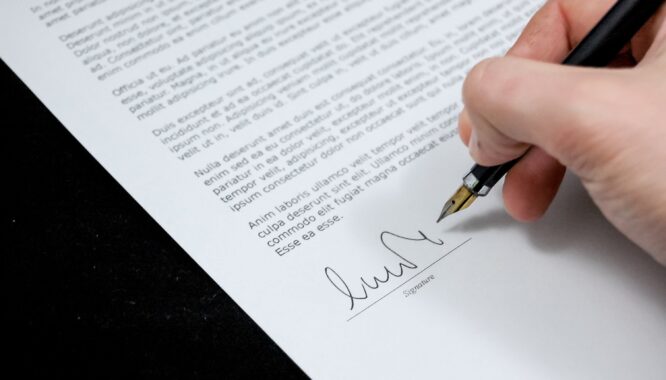
In this article, we will explore the importance and key elements of a confidentiality agreement, also known as a Non-Disclosure Agreement (NDA). We’ll discuss how it establishes a confidential relationship between parties and the significance of keeping shared information secret.
Additionally, we will delve into the legal implications of breaching such agreements and the potential consequences that may arise. This agreement plays a critical role in protecting sensitive data, trade secrets, and proprietary knowledge in various business settings. Stay tuned to gain a comprehensive understanding of the purpose and use of confidentiality agreements.
Related articles:
5 Tips to Optimize and Accelerate Your Human Resources Decisions
Top 5 HR Challenges International Companies Face
What is a Confidentiality Agreement
In the context of human resources, a confidentiality agreement, often referred to as a Non-Disclosure Agreement (NDA), is a legal contract between an employer and an employee. This document is designed to safeguard the organization’s confidential and proprietary information. Employees are often asked to sign one during the onboarding process.
The agreement stipulates that the employee is prohibited from disclosing company-specific details such as trade secrets, business strategies, client data, and other sensitive information either during their employment or after termination.
The purpose of this agreement is to ensure the security and integrity of the company’s valuable data from potential misuse or unauthorized disclosure.
Frequently Asked Questions about Confidentiality Agreements
What is considered as confidential information in an NDA?
Confidential information, in the context of an NDA, can encompass a wide range of data that a company considers sensitive and seeks to protect. This might include, but is not limited to, trade secrets, business strategies, technology blueprints, customer lists, marketing plans, financial data, prototype designs, and unpublished patent applications.
It’s important to note that general knowledge, publicly available information, or information received from a third party under no obligation of confidentiality are not typically considered confidential under an NDA.
Can an NDA be enforced after an employee leaves the company?
Yes, a Non-Disclosure Agreement can remain in effect even after employment termination. This duration, referred to as the ‘post-termination period,’ is usually stipulated in the NDA itself. Its length can vary depending on the nature of the information and the industry.
Typically, it lasts for a few years post-termination. However, in certain cases where the information retains its value over a longer period, the post-termination period might be extended. The main intent is to protect the company’s proprietary information from being used or disclosed inappropriately after an employee leaves the company.
What happens if a confidentiality agreement is breached?
If a confidentiality agreement is breached, the ramifications can be serious and may include both legal and financial repercussions. The aggrieved party, typically the company whose confidential information was disclosed, has the right to seek a legal remedy. This might involve filing a lawsuit for damages, seeking an injunction to prevent further disclosure, or both.
Depending on the circumstances and the specifics of the agreement, the party in breach could be required to pay financial damages, return the disclosed information, and/or cease any activities making use of the confidential information. The exact consequences can vary greatly, depending heavily on the terms of the NDA and the severity and impact of the breach.
To avoid breaching confidentiality agreements, organizations can use an automated contract management platform. These platforms help automate compliance tracking and impose strict access controls, ensuring no agreement gets breached.
Do confidentiality agreements expire?
Yes, confidentiality agreements typically have an expiration date. This is referred to as the ‘termination period’, and its length varies from contract to contract. However, it’s important to note that the expiration of a confidentiality agreement does not automatically allow for the disclosure of confidential information.
Most often, the agreement will stipulate that certain information remains confidential indefinitely or until it becomes publicly known through no fault of the receiving party. As always, the specifics of each agreement will dictate the rules that apply.
Can a confidentiality agreement protect intellectual property rights?
Yes, a Confidentiality Agreement can provide certain protections for intellectual property rights. When confidential information includes intellectual property, such as patents, trade secrets, or proprietary technology, a confidentiality agreement helps prevent unauthorized disclosure or use of that information. However, it’s important to note that a confidentiality agreement alone doesn’t establish or grant intellectual property rights.
For comprehensive protection, it is generally advised to seek formal intellectual property registration, such as patenting inventions or registering trademarks and copyrights. Additionally, businesses in industries like real estate might also consider property management software development services to safeguard and streamline their operations. Beyond this, legal advice should be sought to ensure full and appropriate protection of intellectual property rights.
Is it necessary to have a confidentiality agreement in all types of businesses?
While it’s not mandatory for all types of businesses to have a confidentiality agreement, it is highly recommended. This is particularly true for businesses dealing with sensitive or proprietary information, innovative ideas, or customer/client data.
A confidentiality agreement can help protect this information from being leaked, used without permission, or falling into the hands of competitors. However, the need for a confidentiality agreement ultimately depends on the type of business and the nature of the information it handles. Always consult with a legal professional to understand what is best for your specific business situation.
Can confidential information be shared with third parties under any circumstances?
Yes, confidential information can be shared with third parties under certain circumstances, but only with the express consent of the owner of the information. This is typically done through a process called third-party disclosure, which requires the third party to agree to the same terms of confidentiality outlined in the original confidentiality agreement. Without such an agreement in place, sharing confidential information with third parties could constitute a breach of the confidentiality agreement. It’s essential to seek legal counsel when considering such sharing to ensure the proper safeguards are in place.
What elements should a proper confidentiality agreement contain?
A well-drafted confidentiality agreement should contain several key components. First, it should clearly define what constitutes as “confidential Information”. This could range from trade secrets, business strategies, customer lists, to proprietary technology. Second, the agreement should outline the obligations of the receiving party, including how they can use the information, and the restrictions on disclosure. Third, the agreement should specify the duration during which the confidentiality obligation persists.
Additionally, it’s advisable to include the consequences of breaching the agreement, typically in the form of legal remedies. Lastly, any permissible disclosures, such as to legal or financial advisors, should be clearly stated. Remember that the specifics can vary and it’s always best to consult with a legal professional when drafting a confidentiality agreement.
Can a confidentiality agreement be challenged in court?
Yes, a confidentiality agreement can be challenged in court, although the success of such a challenge will depend on a variety of factors. The most common grounds for challenging include the claim that the agreement was signed under duress, or the assertion that the information was not, in fact, confidential. Furthermore, the agreement can be contested if the information was independently discovered or is in the public domain.
Ambiguities in the agreement can also lead to legal challenges. Courts generally favor clear and specific language in confidentiality agreements. This is why it’s crucial to have these agreements reviewed by a legal professional before signing.
Does an NDA need to be signed by both parties involved?
Yes, a Non-Disclosure Agreement (NDA) needs to be signed by both parties involved. The signing demonstrates that all parties have read, understood, and agreed to the terms and conditions stipulated in the agreement. This mutual agreement is essential for the NDA to be legally binding and enforceable. Should any party breach the terms, the signed agreement serves as a legal instrument for pursuing remedies in a court of law.


-666x380.jpg)
-640x380.jpg)
